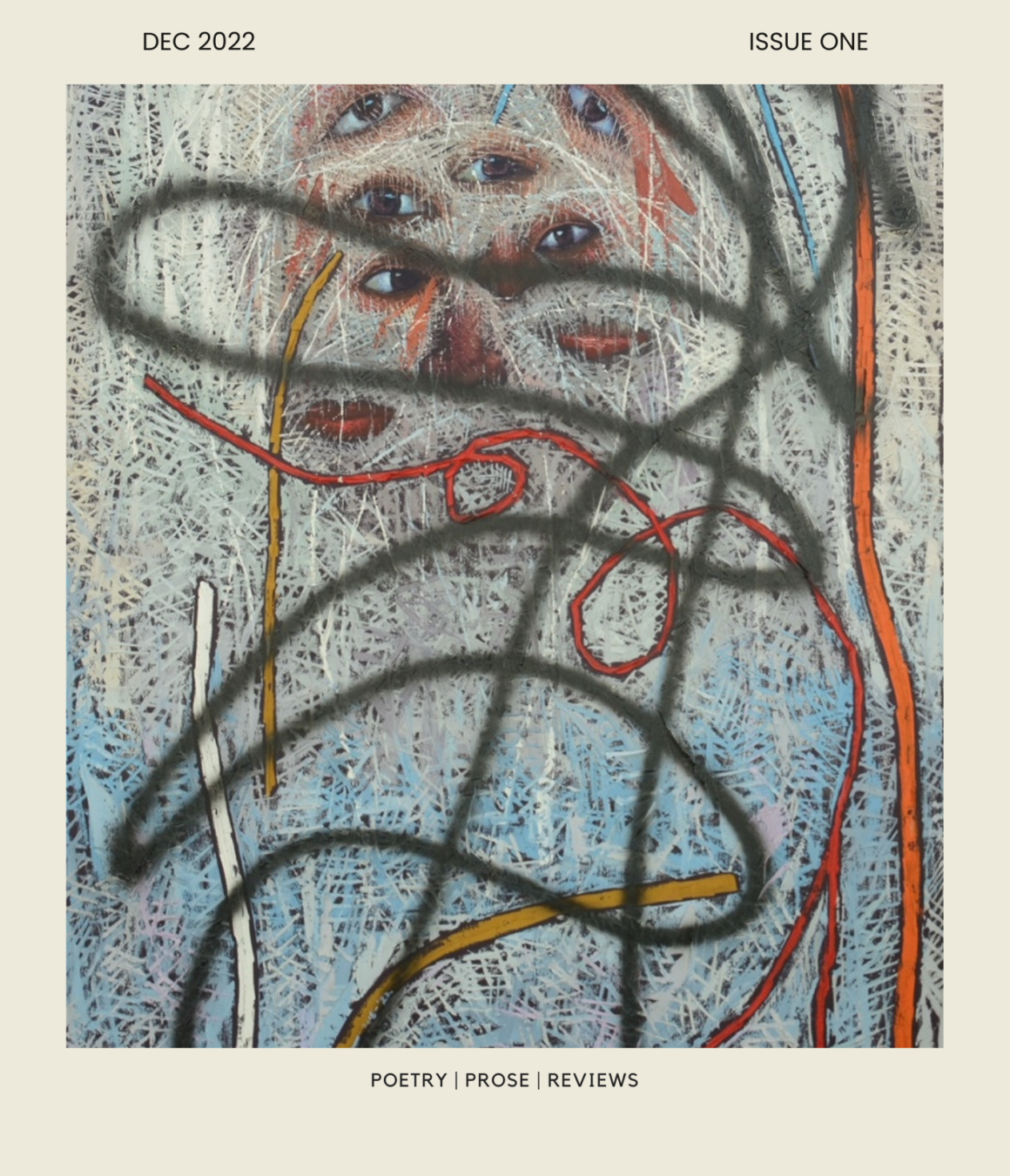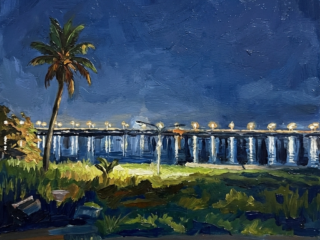We stripped on the long walk. As if in a frenzy, we unbuttoned our school uniforms, undid our shorts zippers, and began pulling them off halfway to the Boloom. We cackled with joy between our teeth, sipped La Casera from fancy bottles, and made jokes we almost believed about the Boloom calling us. The Boloom, less a stream than a swamp, was our Jerusalem; our Mecca; a pilgrimage we rarely missed. It wasn’t our first time in the Boloom or doing this—the stripping thing. After school, on Fridays, we would kick-start our Legediz-benz and zoom off to the Boloom.
On this inauspicious day, all five of us, Bami, Kole, Ugo, Hameed, and I, dived simultaneously into the Boloom, some with their boxers still on. And I, like many other kids, was stark naked. A swell time in the Boloom, of course, was incomplete without a good game of catch-&-play, an advanced version of hide-&-seek. We chased, caught, swam, hid, got caught and chased again. We laughed about how many gulps of bacteria-infested Boloom water we had accidentally swallowed and choked on.
With the sun starting to dim, we knew it was time to go home. I was about to put on my boxers when Ugo asked where Kole was. We looked around, peering at the faces of fellow Boloomers, swimming gleefully. He wasn’t there. We called out to no avail. And eventually, I plunged back into the water, down to the bottom, checking between the leaves of the swamp. What could have happened? Kole was the best swimmer amongst us, after me, of course. I swam farther to the deeper area where the Earth was at its stickiest. And there I found Kole, mid-water, his legs clasped tight by the sticky mud. It didn’t need much thinking. While we played catch-&-play, he had sought a hiding place between the leaves, but the swamp grabbed at his feet. The uprooted leaves in his hands say he had struggled, holding on to them to help him stay afloat, or at least mid-swamp, but they failed him. They let go of Mother Earth and left Kole at her mercy.
I, at once, pulled at his leg, careful enough to avoid the swampy sand. I put him on my back and breast stroked out of the swamp. A few Boloomers, who saw us approach, rushed to help the unconscious Kole. We lay him on the grassy bank of the Boloom. It was a familiar situation, not worth fretting over. I’d seen it in Hollywood movies, how the star pressed till the heroine coughed out water. However, I had hoped it didn’t have to get to the oral resuscitation part.
We pressed and pressed his stomach. But to our utmost petrification, he began to cough out blood instead of water. People began to disperse, with remarks like “I no dey o.” “Sebi na chest dem suppose press nau.” His breath had ceased, his pulse had become almost non-existent, and I wasn’t even sure I could hear his heartbeat, perhaps because mine was beating too loudly. Ugo begged us to leave. Bami was visibly shaken. Hameed had taken to his heels.
We hastily put on our uniforms, I almost forgot I was naked. Little wonder the light-skin girl was staring too intently at me. I wished that was the summit of our problems, though. As we ran off, leaving Kole’s almost lifeless body behind, I noticed the wet patches on Bami’s shorts, evidently caused by his underpants’ wetness. I thought of Kole. I used to tease him about his damp patches. Then I felt a gush of wind rush past me. It wasn’t the impact of my on-running body against the wind, more like the wind overtaking me.
We got away with it quite easily. No one had seen us leaving the school together through the hole in the fence an hour before closing time. We all swore not to have seen him and even helped his parents search for him. We expected the police to knock on our doors with his cold corpse. But that never happened, so life went on almost as usual. We missed Kole, but were particularly grateful to have escaped possible expulsion.
Two years later, Hameed was found dead in the restroom after a recess football match, with his head dipped in the water closet. No one knew how it happened. The door was bolted from the inside, and the toilet had no windows. Therefore, there was no plausible explanation as to how he died. On his death scene, the noise and I began to fade out as living bodies crowded his immobile body. The blood oozing out of his nose was identical to his curly black hair, which was now suddenly falling off. With his head on my lap, I stared at the motionless Hameed as a hand pulled him away from my grasp.
Hameed’s death rocked the entire school. There was no thesis plausible enough to explain it – not that a post-mortem or forensic examination of any sort was carried out on his corpse, of course. The school couldn’t risk having too many prying eyes on the case. Suicide eventually took the blame for his mysterious death. A substantial sum of money was said to have been enough to keep the lips of his relatives sealed.
Our valedictory service without our lost pals didn’t quite have the lustre, even though Hameed’s death had now been over a year. The principal, in her speech, spoke forever about the importance of us students being “grateful to God almighty for making it out alive and well, in a class where one too many unwanted pregnancies, deaths, and mysterious disappearances” had occurred.
I guess Ugo was just about as bored as I was with the unending sermon of Mrs Adelaja. When I sipped from my fancy bottle, he raised his bottle of water, gave me a smug smile and gulped. Shortly after, a cough followed, then another, and a series of incessant coughing. It looked as if he was having a spasm, his eyes beginning to stream tears, nose emitting mucus.
“Hey… bro, are you okay?” I said, disguising my panic. I nudged the sleepy Bami beside me awake. “Here, have it,” I tore out a wad of tissue paper. Ugo made to clear his nose, but on lifting his face off the tissue, his nostrils were bloody. Classmates at our table began screaming when his cough became bloody. And in a moment, he was on the floor rolling, the white shirt beneath his rented black suit soaked with battle sweat.
“Oluwa o! Oluwa o!” Mrs Adelaja kept screaming, to my surprise—and I suspect other’s—her prayers were not to intercede for the dying Ugo, but against “unknown enemies plotting to destroy the stability of Ọ̀sà high school, which she had worked very hard to build.”
Bami helped lift him as we carried him outside the large school hall while others went to get Nurse Precious and the school bus driver.
“Ọpẹ, he—he is not breathing again,” Ṣade, another classmate hurdling around, sobbed.
“Oh! Stop talking nonsense,” Bami retorted, trying desperately to mask the fear in his voice.
“There’s the driver and Nurse Precious,” I said, successfully distracting them from the argument.
A staff of teachers and junior students relieved us of the burden of carrying him into the school bus. And as my eyes fell on my bloodstained palm, I beheld a handful of brown hair. I shot a glance at the proceeding men and sighted with utmost fervour Ugo’s suit pants, wet at the backside. And his eyes into point blank nothingness, I could have sworn was lifeless.
At the general hospital, the nurses insisted on us getting hospital cards, filling forms and paying bills we hadn’t even accumulated before attending to the patient. We didn’t refuse to follow the procedures; we only pleaded they give the patient immediate attention while we kept ourselves busy with their red-tapism. They staunchly refused, saying rules were rules, and it took more than one silly boy whose cigarette smoke had gone wrong in his nerves to change them. Only an hour after we had filled out all the pile of documents did they bother to take a look at him, just to tell us his condition must’ve been more critical than we described and he had stopped breathing. I was outraged and pained at the same time. I looked at Ugo. The bleeding had seized, and he felt all cold now. I smelled smoke. The softness of his hair, peeling off like Hameed’s. The same icy green eyes of Kole’s corpse. My suspicion of someone being on a personal vendetta against us grew certain in my mind. I tried convincing Bami about the possibility of Kole’s ghost getting revenge on us for abandoning his not-totally-dead body on the Boloom bank. But he nearly laughed his big head off, saying, “Ọpẹ, it’s a goddamn coincidence. There are no such things as ghosts.”
“That’s what they say in all the gothic movies I watch—until death kisses them bluntly in the face.”
“Guy, come on. I think you’ve been watching too much of Frankenstein these days.”
“Oh fuck off!” I thrusted his rented tuxedo on his face as I turned to leave. A year later, when I heard of his death, I didn’t cry. I didn’t ask how.
I see Kole more frequently now. I’ve drowned a million times in my sleep. Everything I drink seems to taste like bacteria-laden Boloom water. It all ends tonight, though. It’s 11:59 PM. I’m on Boloom road. I tear off my Aba-made Louis-Vuitton top and peel off my khaki shorts. I see Bami walking side by side with me. Hameed is also pulling off his shorts. There is Ugo as well, tarrying closely behind. Ah! Dear Kole. He’s walking towards us now, gay as always. He’s telling a joke, drinking from my water bottle. My water bottle? Hadn’t I added an ooze of codeine to the juice in the bottle? “Wait, stop…” Oh! Too late.
It’s a half-moon night. He’s smiling at me now from the silvery light of the Boloom surface. Backstroking with his limbs paddling, bidding me nearer. I can smile back now, pull off my underpants and dive right in.
Muiz Ọpẹ́yẹmí Àjàyí studies Law at the University of Ibadan. He's an editor at The Nigeria Review, Poetry reader for Adroit Journal, and a 2023 Poetry Translation Centre UNDERTOW cohort. Winner of the Lagos-London Poetry Competition 2022, University of Ibadan Law LnD Poetry Prize 2022, PROFWIC Poetry Prize second runner-up, shortlisted/longlisted for Ake Poetry Prize, Briefly Write Poetry Prize, Kreative Diadem Poetry Prize, a Best of The Net nominee, he's featuring/forthcoming in 20.35 Africa: An Anthology of Contemporary Poetry, Frontier Poetry, Olongo Africa, Poetry Wales, Aké Review, SAND Journal, Nigerian NewsDirect, Trampset and elsewhere.



